Tax Advice Letter
Dear [Recipient's Name],
I hope this letter finds you in good health and high spirits. I am writing to provide you with some tax advice and suggestions to help you optimize your tax situation and ensure compliance with relevant tax laws.
1. **Organize Your Financial Records**: To make tax filing easier and more accurate, ensure that all your financial records are well-organized and up-to-date. This includes income documents, expense receipts, investment statements, and any other relevant financial information.
2. **Claim All Eligible Deductions and Credits**: Take advantage of all eligible deductions and tax credits to minimize your tax liability. Common deductions include home mortgage interest, medical expenses, charitable contributions, and educational expenses, among others.
3. **Contribute to Retirement Accounts**: Contributing to retirement accounts, such as Individual Retirement Accounts (IRAs) or 401(k) plans, can offer tax benefits. These contributions may be tax-deductible, reducing your taxable income.
4. **Be Aware of Tax Law Changes**: Stay informed about any recent changes in tax laws that may impact your tax situation. Tax laws are subject to amendments, and being aware of these changes can help you plan and adjust your finances accordingly.
5. **Consider Tax Loss Harvesting**: If you have investments that have experienced losses, you may consider tax loss harvesting to offset capital gains and reduce your tax liability.
6. **Consult a Tax Professional**: For complex financial situations or if you're uncertain about any tax matters, consider seeking advice from a qualified tax professional. They can provide personalized guidance tailored to your specific circumstances.
7. **Pay Estimated Taxes (if applicable)**: If you are self-employed or have significant income from sources without tax withholding, consider paying estimated taxes quarterly to avoid penalties and interest.
8. **Avoid Tax Scams**: Be vigilant against tax scams and fraudulent schemes. The IRS will never contact you through email, text messages, or social media to request personal or financial information.
Remember, the information provided in this letter is for general guidance only and should not be considered as professional tax advice. Individual tax situations may vary, and it is essential to consult with a qualified tax advisor for personalized advice.
If you have any questions or need further assistance, please do not hesitate to contact me. I am here to help you navigate through the complexities of the tax system and ensure your financial well-being.
Wishing you a successful and stress-free tax season.
Sincerely,
[Your Name]
[Your Contact Number]
[Your Email Address]
Professional Tax Advice Letter for Individual Client
Subject: Tax Advisory for Fiscal Year [Year]
Dear [Client Name],
This letter is to provide guidance regarding your tax obligations for the fiscal year [Year]. Based on the information you provided, we recommend that you consider the following points to optimize your tax position:
1. Review eligible deductions and credits applicable to your income bracket.
2. Ensure timely filing of all tax forms to avoid penalties.
3. Maintain organized records of all relevant financial documents.
Please contact us should you require further clarification or assistance in preparing your tax return.
Sincerely,
[Advisor Name]
[Position]
[Firm Name]
Tax Planning Advice Email for Business
Subject: Strategic Tax Planning Recommendations for [Company Name]
Dear [Recipient Name],
As part of our ongoing advisory services, we recommend reviewing your current tax strategies for [Year]. Key areas to focus on include:
- Maximizing business deductions and allowable expenses.
- Structuring transactions to minimize tax liability.
- Reviewing employee benefit plans for tax efficiency.
Attached are detailed guidelines and projections. Please schedule a meeting to discuss implementation strategies.
Best regards,
[Advisor Name]
[Position]
[Accounting Firm]
Preliminary Tax Advice Letter for Complex Case
Subject: Preliminary Tax Guidance – [Case Description]
Dear [Client Name],
After reviewing your financial and business records, we provide preliminary recommendations to address potential tax exposure. These include:
1. Identifying areas for compliance improvement.
2. Considering available tax reliefs and exemptions.
3. Evaluating timing of income recognition and deductions.
This advice is provisional and subject to further analysis. Please provide additional documentation to enable a complete review.
Regards,
[Advisor Name]
[Position]
[Firm Name]
Informal Tax Guidance Message
Subject: Quick Tax Tips for [Year]
Hi [Client Name],
Just a quick note to help with your taxes this year:
- Make sure all receipts and invoices are organized.
- Check if you’re eligible for deductions on healthcare and education expenses.
- Consider contributing to tax-advantaged accounts before the year-end.
Let me know if you want a more detailed review.
Cheers,
[Advisor Name]
Detailed Corporate Tax Advisory Letter
Subject: Corporate Tax Strategy for Fiscal Year [Year]
Dear [Board/Management Team],
Following our assessment of your company’s financials, we suggest the following strategies to optimize tax efficiency:
- Review depreciation schedules and asset capitalization policies.
- Explore tax credits for research and development initiatives.
- Consider the impact of international operations on overall tax liability.
We recommend scheduling a strategic session to implement these actions effectively.
Sincerely,
[Advisor Name]
[Position]
[Accounting Firm]
Quick Tax Advice Email for Freelancers
Subject: Freelance Tax Tips – [Year]
Hi [Client Name],
A few quick tax tips for this year:
- Track all business-related expenses carefully.
- Set aside funds for estimated tax payments.
- Review eligibility for home office deductions.
Let me know if you want me to prepare a full summary.
Best,
[Advisor Name]
What is a Tax Advice Letter and Why It Is Important
A Tax Advice Letter is a formal or informal communication from a tax advisor, accountant, or financial professional to a client providing guidance on tax matters.
Purpose:
- Ensure compliance with tax laws.
- Minimize tax liability through strategic planning.
- Advise on deductions, credits, and exemptions.
- Provide clarity in complex tax scenarios.
Who Should Issue a Tax Advice Letter
- Certified accountants or chartered tax advisors.
- Financial consultants with tax expertise.
- Legal professionals specializing in tax law.
- Corporate finance officers providing internal guidance.
To Whom Should a Tax Advice Letter Be Addressed
- Individual taxpayers seeking guidance.
- Business owners and corporate executives.
- Freelancers and self-employed professionals.
- Organizations needing clarification on regulatory tax matters.
When to Send a Tax Advice Letter
- Before annual tax filing deadlines.
- During mid-year financial planning.
- When major transactions or investments are undertaken.
- In response to tax notices or audits.
- For complex cases involving multiple jurisdictions or business operations.
How to Prepare and Send a Tax Advice Letter
- Collect all relevant financial and tax information.
- Review applicable tax laws, deductions, and credits.
- Draft recommendations clearly and logically.
- Attach supporting documentation or reference guides.
- Decide on mode of delivery (email, printed letter, or PDF).
- Ensure compliance with confidentiality and professional standards.
Requirements and Prerequisites Before Sending Tax Advice
- Up-to-date client financial statements and records.
- Knowledge of current tax laws and applicable changes.
- Clear understanding of client’s financial goals.
- Identification of deadlines for filing and payments.
- Verification of any special exemptions or credits available.
Formatting Guidelines for Tax Advice Letters
- Length: 1–3 pages depending on complexity.
- Tone: Professional, formal, and precise.
- Style: Structured with headings, bullet points, and numbered lists.
- Mode: Email for speed; printed letters for official or legal purposes.
- Wording: Avoid jargon, explain technical terms clearly.
Common Mistakes to Avoid in Tax Advice Letters
- Giving vague or incomplete recommendations.
- Ignoring recent tax law changes.
- Overlooking deadlines or filing requirements.
- Failing to clarify assumptions or limitations of advice.
- Sending advice without proper review or authorization.
Elements and Structure of a Tax Advice Letter
- Subject line indicating purpose of letter.
- Greeting addressing the client.
- Summary of financial context or case.
- Detailed tax recommendations with supporting points.
- References to applicable laws or guidance.
- Closing with next steps or contact for clarification.
- Signature, designation, and company information.
- Attachments if necessary (worksheets, schedules, references).
After Sending a Tax Advice Letter – Follow-Up
- Confirm receipt of the letter if sent digitally or via post.
- Schedule follow-up consultation to discuss implementation.
- Track deadlines mentioned in the advice to ensure compliance.
- Maintain record of advice for future audits or reference.
Tips and Best Practices for Effective Tax Advice
- Keep recommendations clear and actionable.
- Use bullet points for complex guidance.
- Provide examples to illustrate tax implications.
- Maintain confidentiality and professional standards.
- Update advice if laws or client circumstances change.
Pros and Cons of Sending Tax Advice Letters
Pros:
- Provides clients with clear guidance and confidence.
- Reduces risk of non-compliance or penalties.
- Strengthens professional relationships with clients.
Cons:
- Requires careful attention to accuracy and compliance.
- Can create liability if advice is misinterpreted or errors occur.
- May need frequent updates due to changing tax laws.
Comparison with Other Tax Communications
- Tax Advice Letter vs. Informal Email Tips: Letters are formal, detailed, and legally traceable; emails are quick and general.
- Tax Letter vs. In-Person Consultation: Letters provide a permanent record; consultations allow immediate interaction and clarification.
- Tax Letter vs. Financial Report: Letters offer recommendations and guidance; reports mainly present data without advice.

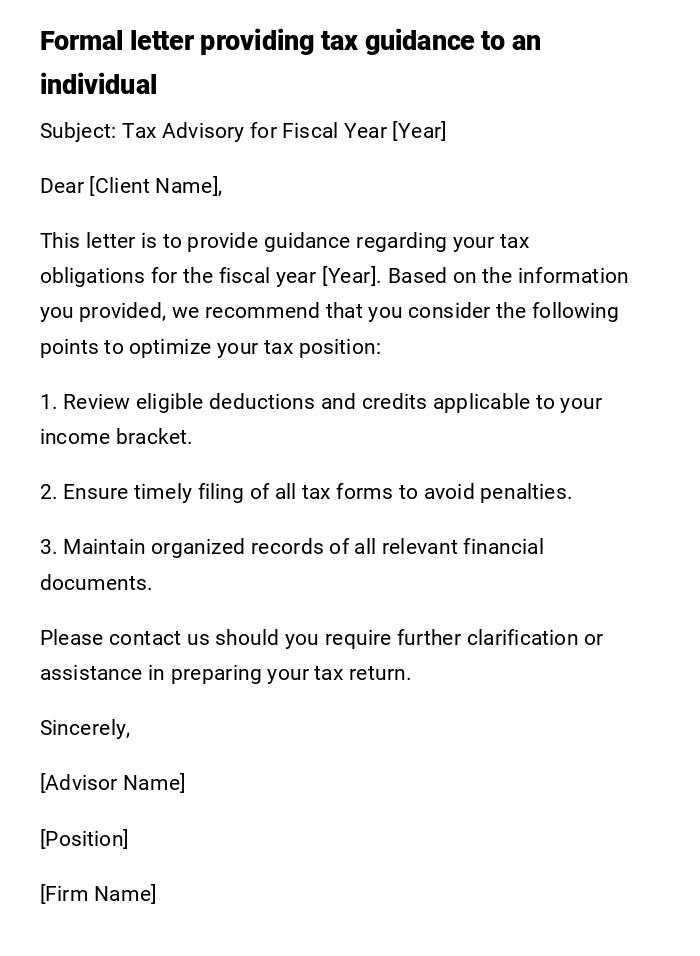
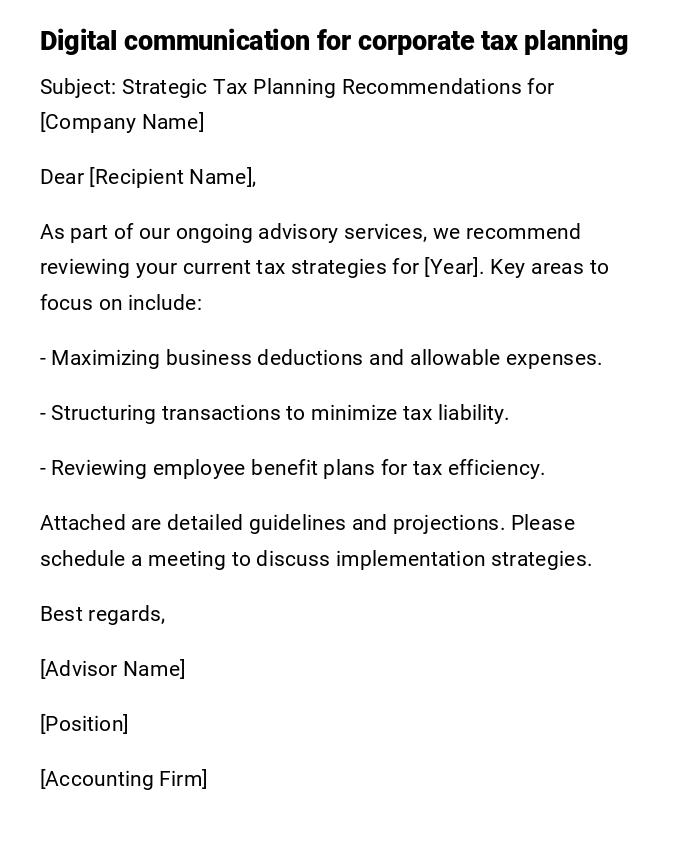
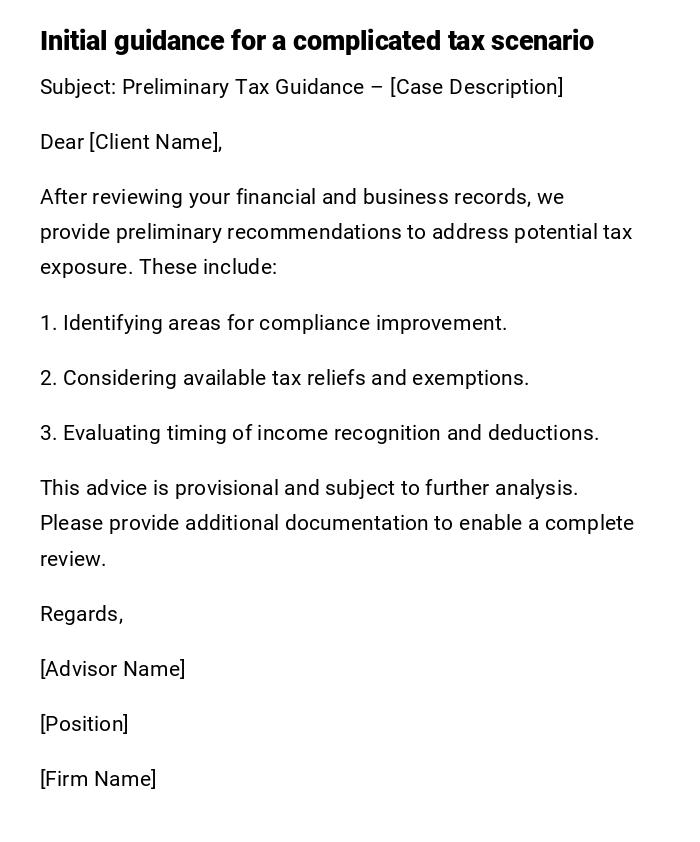
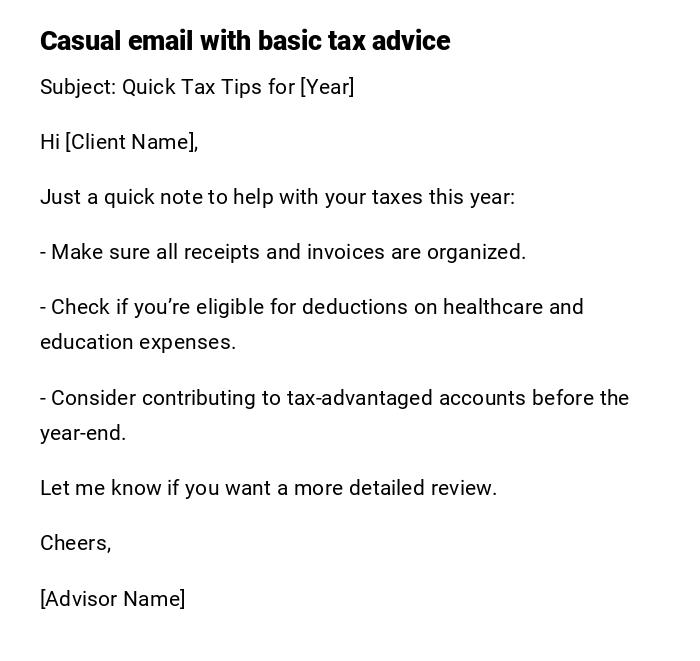
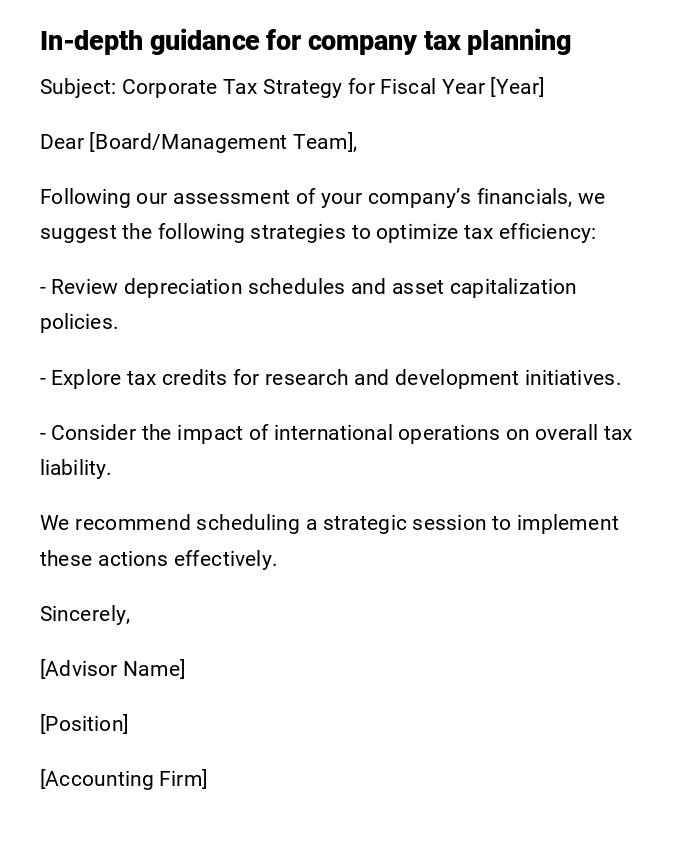
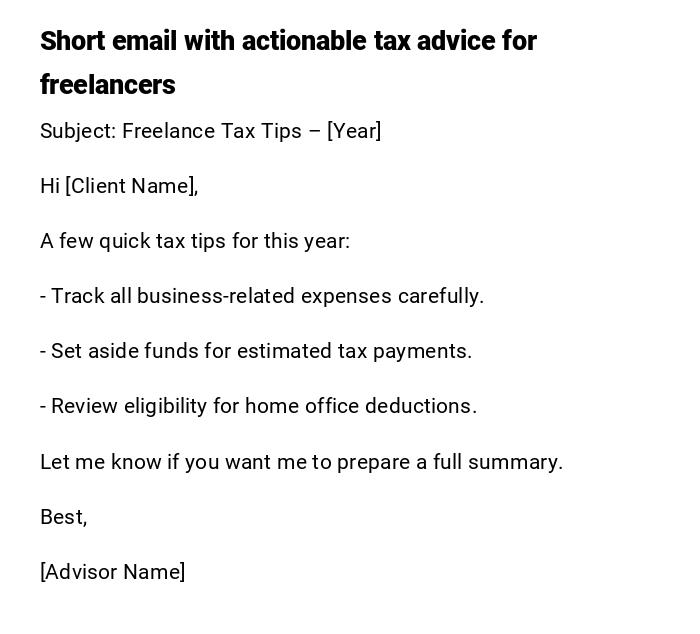

 Download Word Doc
Download Word Doc
 Download PDF
Download PDF